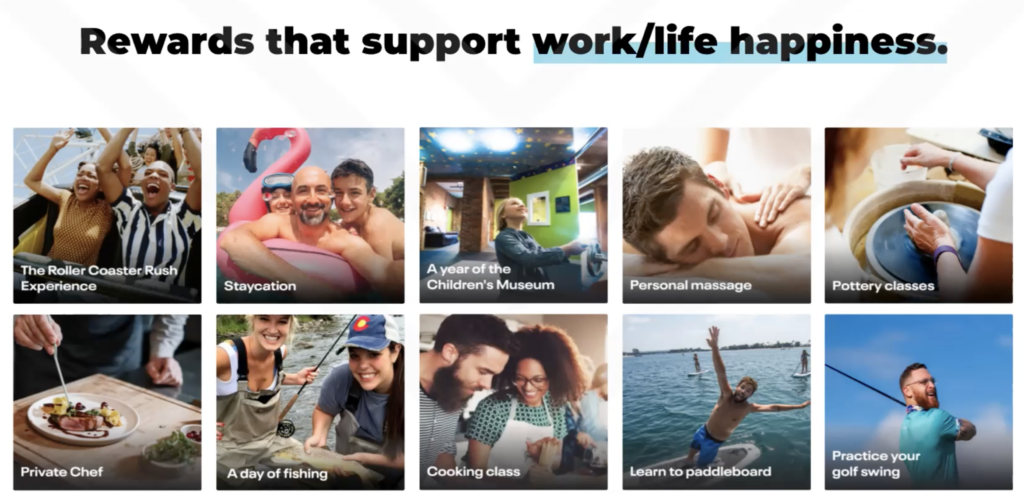Making Employee Recognition a Priority in Your Hybrid Workplace


Morgan Chaney has been taking pottery classes as part of her “quarantine gift” during the coronavirus pandemic, indulging in the type of activity that helps employees to “get away from our screens and into the world to spend time with the ones we love–to help escape those pressures from life and the workplace overall,” said Chaney, the senior director of marketing and employer branding at Blueboard, an employee rewards and recognition platform. She remarked upon her personal experience in a thought-leadership spotlight at From Day One’s June virtual conference, “The New Benefits that Employees Need and Want Today.”
The aforementioned life and work pressures have never been greater than during the Covid-fueled turmoil of the past 17 months, making it even more important for employers to focus on employee satisfaction and retention as increasing numbers of employees return to brick-and-mortar offices for at least part of their work schedules, she said.
The pottery classes were part of an employee-rewards system implemented by Blueboard, and Chaney emphasized that corporations can benefit from such recognition programs for workers across the board, regardless of industry or location. “Employee appreciation shouldn’t be one day; it should be all year round,” particularly as both managers and employees attempt to navigate the rapidly evolving hybrid workforce, said Chaney.

“We found that over 70% of HR leaders are wanting to make the shift to hybrid work this year,” she said, adding that workers “should all be good at self-regulating” and “taking care of our own mental and physical health,” she said. “The pandemic has totally thrown us off from that,” she said. “Productivity is at an all-time high, but so is employee burnout. So as an employer, it’s really important for you to intentionally encourage employees to self-regulate.” It’s also imperative to offer resources and follow a strategic, well-thought-out plan that looks at several components: “Fostering wellbeing, fostering inclusion, and offering power,” she said.
“Retention is becoming more and more top of mind for all of us,” Chaney said. “You’ve probably heard the term ‘the Great Resignation’ floating around. It’s upon us. Recent data for Microsoft is showing that over 40% of employees are planning to leave their jobs this year, which is up from 15% pre-pandemic–nearly triple growth in just one year’s time.”
“So if you don’t take care of your employees, your competitors will,” Chaney said. “And we’d love to help prevent that through meaningful recognition programs, programs that let your employees feel like they’ve made an impact and show them that they’re seen and valued.”
And that doesn’t necessarily have to mean pottery classes, she said. There has to be a general attitude change, commitment to recognition, and personalization of what works best for different employees. “Ultimately, we’re all juggling our personal responsibilities, we have unique passions and interests, and a one-size-fits-all approach will not work anymore, especially in a hybrid environment,” she said. “So it’s really important, as an employer, to consider offering a wide range, or more types [of rewards and recognition] that meet employees where they are today.”
How to achieve that at scale? “Ultimately, at Blueboard, we understand and support that all employees want to do different things. They don’t all drink coffee, so that Starbucks card might fall flat–or they might not want to go skydiving. That might make them totally scared to death. So ultimately, we have a recognition platform that lets employees choose the reward that’s most meaningful to them, not to everybody else, and choose what matters to them today–not tomorrow.”
Recognition programs can include apps through which employees can earn points and select rewards, or a regular forum for peers and bosses to publicly acknowledge good work. Employer awareness, flexibility, and communication are key to ensuring the success of any recognition and reward program, Chaney said.
“This is where you can encourage managers to host conversations one-on-one with their direct report,” she said. “Or if you want to make it into a more systematic process, you can add questions around recognition preferences into your onboarding surveys to help create a kind of a repository of employee preferences that managers can access on their own.”

Among the things to consider, she said: “Does your employee like public shoutouts? Or would they prefer one-on-one, more intimate thank you’s from their manager? Do they want you to celebrate their birthday or work anniversary, or would having that be announced at a company all-hands make them totally cringe? And these are important things to understand, because beyond learning about your employees’ motivators, you also want to really dial into their languages of appreciation.”
By paying attention to those languages and individualized needs of employees, “recognition can foster inclusivity,” she said. “A lot has changed with the pandemic. And it might be that for certain employees, or even teams overall, the performance bar needs to be reassessed. Maybe there’s new behaviors to evaluate, maybe there’s new benchmarks that really point to that team being successful.”
The task, then, is to “work with your team leaders to best evaluate individual KPIs and ultimately determine what does signal great work [and] what has changed in the pandemic–and what do we want to adopt into our performance cycles.”
Chaney added a note about fairness and equity: “As you’re setting new performance bars, you also want to make sure that you’re resetting our own personal standards for how we’re grading what great work looks like–and this is where we talk about things like unconscious bias. As we migrate to a hybrid work model, it’s really natural for the managers who might have employees in office with them, versus working from home, to prefer the employees that you work side-by-side with. It’s nothing personal, it’s just that these relationships are naturally deeper when you get to have more one-on-one water cooler, lunch, happy-hour time with these employees. But in a hybrid workplace, we need to work with our leaders to make sure they avoid unconscious bias and ensure that all of their teams or accomplishments are reviewed on the same playing field.”
Editor's note: From Day One thanks our partner who sponsored this thought-leadership spotlight, Blueboard.
Sheila Flynn is a Denver-based journalist who has written for the Associated Press, Bloomberg News, the Sunday Independent, and the Irish Daily Mail. She is a graduate of the University of Notre Dame.
The From Day One Newsletter is a monthly roundup of articles, features, and editorials on innovative ways for companies to forge stronger relationships with their employees, customers, and communities.